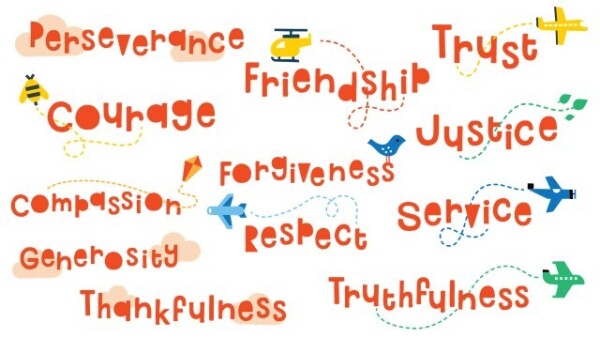Religious Education
Flying High in RE at St Helen’s
Flying High in RE at St Helen’s
‘They will soar high on wings like eagles. They will run and not grow weary. They will walk and not faint.’ Isaiah 40:31
Our vision for RE comes from our school vision:
‘Excellence, enjoyment and achievement together in a nurturing Christian community.’
We want our children to explore the deep roots of wisdom found in Christianity and other world views and learn to ask questions through their study of RE, to prepare them for the diverse landscape of modern Britain and producing learning that they are proud to share with others and helps them excel.
Our goal is to see children flourishing, nurturing their unique talents and abilities whilst also welcoming those of all faiths and none.
Intent:
Why do we teach RE?
As a Church of England school, we seek to follow the Church of England’s Statement of entitlement for Religious Education and the locally agreed South Glos Syllabus.
Church of England Religious Education in Church schools are:
- To enable pupils to know about and understand Christianity as a living faith that influences the lives of people worldwide and as the religion that has most shaped British culture and heritage.
- To enable pupils to know and understand about other major world religions and world views, their impact on society, culture and the wider world, enabling pupils to express ideas and insights.
- To contribute to the development of pupils’ own spiritual/philosophical convictions, exploring and enriching their own beliefs and values.
In addition, we want to prepare them for the diverse landscape of modern Britain; welcoming those of all faiths or none. As they progress through the school the children receive a rich diet of teaching, visitor experiences, music and worship to inspire and uplift them.
Locally Agreed South Glos RE Syllabus Principal Aim:
The principal aim of RE is to engage pupils in systematic enquiry into significant human questions which religion and worldviews address, so that they can develop the understanding and skills needed to appreciate and appraise varied responses to these questions, as well as develop responses of their own.
Implementation:
What do we teach in RE?
In RE we aim to give children a grounded understanding of Christianity and the major world faiths. As the children progress through the school they will encounter different religions and worldviews. In Key Stage One, children will encounter Christianity, Judaism and Islam. In Key Stage Two, children will revisit these religions, but also encounter Hinduism and non-religious world views, such as Humanism.
An important aim of RE is that children are encouraged to reflect on their learning and make their own decisions about what they believe. The aim of RE is not to make children into religious believers, but to understand that religion and world views influences and sustains many people in the world today, and to consider the wisdom of these traditions, and reflect on what they might take from it. Our teaching is rooted in the Church of England, but we provide a space for all children to express their religion or for world view.
Our curriculum follows the locally agreed syllabus for South Gloucestershire. In addition, we use the Understanding Christianity resource for our teaching of Christianity.
The scheme of work has been revised and developed put in place following a structured meeting with Laura Harris, Schools Adviser and SACRE Adviser on 3.11.2022 and considering the revised South Glos Syllabus. The sequence has been developed so children in all Key stages can build on prior knowledge around Christianity as each year group will spend 50% of their curriculum time on Understanding Christianity key Questions. The other 50% has been chosen to ensure children are spending a proportionate amount of time on other world religions and also some understanding of non-religious world views. The justification for the implementation of the scheme of work in this order is to ensure the children have a wide ‘scope’ of learning.
Scope
What are the key concepts or threads that run through the curriculum? Why these?
Due to the nature of the school demographic make up- 50% of curriculum time is to be focused on other religious beliefs. This is to ensure that children are developing their understanding of the diverse nature of our world.
What are the identified end points?
Children having completed the whole scheme would have experienced a wide range of faiths and encountered non-religious worldviews to ensure that they are understanding the global context. This is to be built on the work of our Connected Curriculum and Being a Brave Change maker.
In order to build on prior learning some aspects, such as incarnation are developed at the same time of year. The small building blocks of content (components) so that children return to faiths from previous years ensure that prior knowledge is built on top of each other overtime to help pupils to understand more complex ideas or be successful in more complex activities (composite).
We feel by adjusting the focus on certain religions when answering the key question it gives the children the opportunity to develop their knowledge, skills and understanding and ensure balance across different worldviews including Christianity.
Impact:
How do we teach RE?
Religious Education at St Helen’s may be taught through Art, Drama, Storytelling and investigating artefacts. We encourage children to develop a knowledge of the rich tradition and culture of religious art and music; responding and reflecting on what they may learn from it.
Above all, we believe that the Christian values underpinning our education will enable the children to become confident, reflective, spiritual and morally aware people who can play a role in shaping modern Britain.
Religious Education Curriculum at St Helen's Scheme of Work
St.Helen’s Core Christian Values:
Across a two year cycle, our twelve distinct Christian values are covered across the school.


